- europages
- >
- COMPANIES - SUPPLIERS - SERVICE PROVIDERS
- >
- sewage sludge
Results for
Sewage sludge - Import export
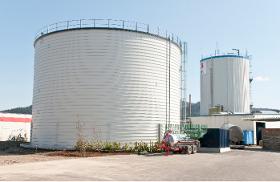
LIPP GMBH BEHÄLTER UND SYSTEMLÖSUNGEN
Germany
LIPP® Liquid Storage Tanks are fabricated with best material, as this is the most important quality factor. Municipal/industrial waste water and sludge or certain processing, intermediate and end products from the chemical, pharmaceutical and food processing industries set high requirements regarding the tank material, for example. LIPP offers a variety of materials, ranging from galvanised steel through the combination material Verinox to highalloy stainless steels. Variants waste water tanks sewage sludge tanks process water tanks storage tanks firefighting water tanks Mixing and compensation tanks buffer tanks stockable sludge tanks rainwater reservoirs Filtrate water tanks activation tanks Percolating filter tanks Landfill leachate tanks & Special tanks on request
Request for a quote
LIPP GMBH BEHÄLTER UND SYSTEMLÖSUNGEN
Germany
SYSTEM SOLUTIONS FOR SEWAGE SLUDGE DIGESTION In the municipal sector, the focus is on the production of biogas from sewage sludge. The aim is to make the energy potential of the primary and secondary sludge from anaerobic sludge digestion usable. On the one hand heat and electrical power is obtained for operation of the sewage plant. On the other hand, the sludge is conditioned so that the other aerobic process stages can run more efficiently and thus more cost effectively. The Lipp KomBio reactor has established itself as an ideal solution in the municipal sector due to its construction and long service life and has been successfully installed in hundreds of plants at home and abroad. Thanks to the application of the SBR process in our digesters, and the tank geometry and construction, it is possible to make optimum use of the low energy potential of the sewage sludge and operate sewage sludge digestion economically.
Request for a quote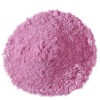
OEN CHEMICALS GMBH
Austria
Cobalt sulfate monohydrate (CoSO₄ ⋅ H₂O) is a versatile compound that has gained recognition in various industries due to its unique properties It is meticulously synthesized through a precise combination of cobalt and sulfur, resulting in a fine crystalline powder The compound’s solubility in water makes it highly adaptable and essential for applications spanning agriculture, electronics, and more. In the agricultural sector, Cobalt Sulphate Monohydrate plays a crucial role in ensuring the health and vitality of livestock It is an essential trace element necessary for the synthesis of vitamin B12, a nutrient vital for metabolic processes in ruminant animals. Farmers enhance the overall well-being and growth of cattle, sheep, and other livestock, by incorporating this compound Also Essential in the manufacturing of pigments and dyes Its hygroscopic nature and essential role in growth further underscore its importance in both industrial and agricultural sectors.
Request for a quote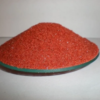
OEN CHEMICALS GMBH
Austria
Cobalt sulfate heptahydrate (CoSO₄ .7H₂O) is a versatile compound that has gained recognition in various industries due to its unique properties Cobalt sulfate heptahydrate is characterized by its vibrant pink to red crystalline appearance The common use of Cobalt sulfate heptahydrate is applied in the manufacturing of pigments, more specifically in the production of blue and green ceramic glazes and glass. its role in electronics is pivotal it is a key component in lithium-ion batteries, fueling the ever-expanding market for portable electronic devices and electric vehicles, enhancing the longevity and performance Additionally, Cobalt sulfate heptahydrate serves as a catalyst in chemical processes, enabling the production of valuable products across industries such as pharmaceuticals and petrochemicals
Request for a quote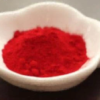
OEN CHEMICALS GMBH
Austria
Cobalt sulfate anhydrous (CoSO₄ ), is a versatile compound that has gained recognition in various industries due to its unique properties It lacks water molecules in its structure, distinguishing it from hydrates The compound appears as a fine, light pink crystalline powder It is highly soluble in water, facilitating its use in various applications Cobalt Sulfate Anhydrous is commonly serving as an electrolyte solution for depositing cobalt coatings onto metal surfaces. This transmits them with enhanced corrosion resistance and durability, enabling them to be suitable for utilization in industries including automotive, aerospace, and electronic It also Provides necessary cobalt supplementation in animal nutrition, particularly for cobalt-deficient areas Where it supports enzymatic processes in both plants and animals, contributing to growth and health
Request for a quote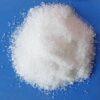
OEN CHEMICALS GMBH
Austria
Chemical application and strengths: Despite being a monohydrate salt (crystallized from clod water) the salt can also crystalize in hot water to become anhydrous (water-free). This property becomes possible as it has a high melting point of 156 degrees Celsius. This property along with the ability to bond with other metal ions to form complex molecules makes it a good chelating agent for several industrial applications. Some of these applications include the removal of limescale from evaporators and boilers. The industrial-grade citric acidis one of the active agents in the preparation of kitchen and bathroomcleaning agents. It is a strong breach with a PH of about 3.2, which makes it a good solution of removing rust from metals such as steel as it combines with rust particles with ease. In the same line, it reacts with free ions on the surface of stainless steel to prevent further corrosion.
Request for a quote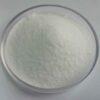
OEN CHEMICALS GMBH
Austria
Chemical appearance: Anhydrous citric acid is presented in a white crystalline powder. It is also packaged in the form of colorless granules or crystals. The crystals have no odor but have a strong acid taste. Chemical application and strengths: Anhydrous citric acid has similar properties to citric acid monohydrate. The difference is the crystallization procedure. While the monohydrate citric acid is crystalized in cold water, the anhydrous forms are crystallized in water at a temperature of 78 degrees Celsius. In the process, it loses all the water within the crystals. Citric acid anhydrous is one of the strong edible acids. Due to that property, it is a common food additive to enhance its flavor. It is also used for preservation of foods especially candies and soft drinks. In addition, it reacts with different metals to form citrate salts that are used as dietary supplements for people who lack minerals such as iron, sodium and magnesium.
Request for a quote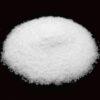
OEN CHEMICALS GMBH
Austria
Chemical appearance: Caustic soda pearls appear as white spherical or semi-spherical granules with slightly perceptible color. Caustic soda pearls are water-soluble with an exothermic reaction, and they depict stability in normal conditions. Sodium hydroxide is a highly alkaline substance that dissociates completely in water into sodium and hydroxyl ions. Chemical application and strengths: Caustic soda pearls or Sodium Hydroxide is one of the important inorganic materials for various industries all over the world. The major demand for caustic soda is evident in the paper industry for the pulping and bleaching process. Caustic soda is also a crucial raw material in aluminum production for dissolving bauxite ore. Caustic soda also finds many uses in the applications for degreasing and treatment of packaging in the food industry. The use of caustic soda is also prominent in chemical processing as a basic feedstock for various downstream products like plastics, solvents, etc.
Request for a quote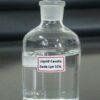
OEN CHEMICALS GMBH
Austria
Chemical appearance: Liquid Caustic Soda Lye is basic a solution of sodium hydroxide. Depending on the intended application, it can be diluted to 32% or 50 %. The solution is colourless and does not have any smells. It is a salt formed by the reaction of sodium and water. Chemical application and strengths: The caustic soda solution is a strong base that is used in various applications across various industries. Some major applications include 1. It is used in the purification of water and water treatment such the partial water softening in drinking water production 2. It is used for cleaning facilities in dairy products industries 3. It is used in the demineralisation of water as it helps in the regeneration of ion exchangers 4. In the textile industry, it used for the preparation of the spinning solutions 5. It is used as an ingredient for various pharmaceutical products such as sodium lactate
Request for a quote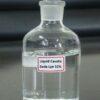
OEN CHEMICALS GMBH
Austria
Chemical appearance: Liquid Caustic Soda Lye is basic a solution of sodium hydroxide. Depending on the intended application, it can be diluted to 32% or 50 %. The solution is colourless and does not have any smells. It is a salt formed by the reaction of sodium and water. Chemical application and strengths: The caustic soda solution is a strong base that is used in various applications across various industries. Some major applications include 1. It is used in the purification of water and water treatment such the partial water softening in drinking water production 2. It is used for cleaning facilities in dairy products industries 3. It is used in the demineralisation of water as it helps in the regeneration of ion exchangers 4. In the textile industry, it used for the preparation of the spinning solutions 5. It is used as an ingredient for various pharmaceutical products such as sodium lactate 6. It is used in the refining and desulphurisation in the petroleum
Request for a quote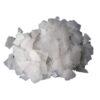
OEN CHEMICALS GMBH
Austria
Chemical appearance: Caustic soda flakes are white translucent solid crystals. These waxy white crystals are odourless. The crystals are soluble in water and glycerol. This is an alkali, which is a combination of sodium cations and hydroxide anions (NaOH). Chemical application and strengths: White Caustic has a number of applications in various industries. Here are some of the most popular ones. 1. It is used in the manufacture of synthetic fatty acids, synthetic detergents and making of soap 2. It is used in the production of cellulose pulp and paper 3. It is used as a scouring agent, silk polish agent in silk print and a cloth desizing agent 4. It is used to produce other chemicals that include formic acid, sodium cyanide and borax
Request for a quote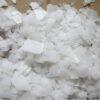
OEN CHEMICALS GMBH
Austria
Chemical appearance: Caustic soda flakes are white translucent solid crystals. These waxy white crystals are odourless. The crystals are soluble in water and glycerol. This is an alkali, which is a combination of sodium cations and hydroxide anions (NaOH). Chemical application and strengths: White Caustic has a number of applications in various industries. Here are some of the most popular ones. 1. It is used in the manufacture of synthetic fatty acids, synthetic detergents and making of soap 2. It is used in the production of cellulose pulp and paper 3. It is used as a scouring agent, silk polish agent in silk print and a cloth desizing agent 4. It is used to produce other chemicals that include formic acid, sodium cyanide and borax
Request for a quote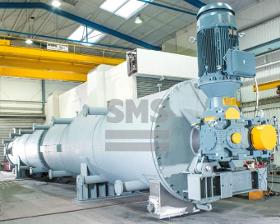
BUSS-SMS-CANZLER GMBH
Germany
SMS offers sludge drying systems with horizontal thin film dryers for treatment of sludge from municipal as well as from industrial waste water treatment plants. Variations of this sludge treatment process are: Pre-drying up to 35 to 50 % dry solid content before incineration in fluidized bed incinerators 65 to 75 % dry solid content before combined incineration with garbage, composting or landfill Full drying up to 85 to 95 % before thermal utilization as bio-fuel for cement kilns, coal fired power stations, pyrolysis, gasification or other conversion processes before composting and agricultural usage as fertilizer and for soil reclamation In all these drying processes the thin film dryer is the first choice.
Request for a quote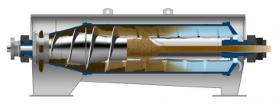
FLOTTWEG SE
Germany
The demands on the quality and efficiency of sewage treatment plants are growing from year to year, not least due to rising energy and disposal costs. As a result, using decanters to dewater sludge means using state-of-the-art technology. The C-series decanters from Flottweg achieve high performance with reduced energy consumption. Flottweg Wastewater Decanters offer advantages over other processes and competitors' machines: ► High dry solids values in the discharged material ► Higher power density within a small footprint ► Powerful Flottweg Simp Drive® drive ► Reduction of operating costs due to reduced need for flocculant ► Additional energy recovery with the Flottweg Recuvane® system ► Economical bowl and scroll drive ► duces the energy consumption of your decanter by 10 to 30 percent
Request for a quote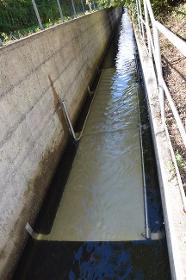
KASAG SWISS AG
Switzerland
Waste water treatment plants and surface waters have enormous energy potential. A sewage treatment plant, for example with 90 million litres of wastewater daily, reducing the wastewater temperature by using heat exchanger by around 1°C, generates a power of about 4.3 MW. The comparative potential for energy recovery from the surface water is even higher. Environmental aspect Induced by humans, water temperatures of the surface and streams have steadily increased, not least owing to the inflows from sewage water treatment. This has serious consequences on the flora and fauna. If heat is extracted from purified water in the sewage treatment plant or from surface waters and from streams, and water temperature is thereby reduced, this will have a positive effect on the entire ecological system. With KASAG heat exchanger systems, on the one hand, the energy requirement of the sewage treatment plant can be covered and, on the other, buildings in near vicinity can be heated or cooled.
Request for a quote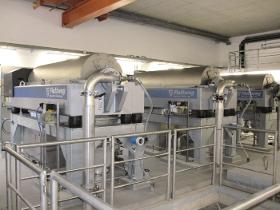
FLOTTWEG SE
Germany
In the process of treating waste water, fine biological sludge is constantly produced during the decomposition process at a sewage treatment plant. For a stable decomposition process in the biological treatment phase, the sludge produced in the secondary sedimentation pond, also known as excess sludge, is removed and fed into the digestion tower. Flottweg's OSE decanters thicken the sludge before it enters the digestion tower. Sewage treatment plants benefit from an even feeding of the digestion tower and can thus optimally use the volume of the digestion tower. The Flottweg OSE decanter is specially designed for sludge thickening. ► Highest gas yield through constant feeding of the digestion tower ► Best possible thickening even with changing feed conditions ► Larger sedimentation volume (due to deep pond and steep cone) enables highest power density (10 - 20 percent) with minimum space requirement
Request for a quote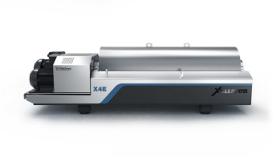
FLOTTWEG SE
Germany
Honored with the German Innovation Award 2019, the Xelletor series is one of the greatest achievements in the field of sewage sludge. Dewatering sewage sludge is standard for wastewater treatment plants and since it usually has to be transported away, operators have an interest in separating as much water as possible from the sludge. This saves weight and thus reduces costs. Savings of up to 10% in sludge volume and 34% in energy consumption are possible. Our Xelletor high-performance centrifuge inspires customers all over the world with the many years of technical know-how and innovative spirit behind it.
Request for a quoteDo you sell or make similar products?
Sign up to europages and have your products listed
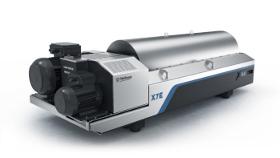
FLOTTWEG SE
Germany
Flottweg has developed a unique centrifuge concept especially for the high-level dewatering of sewage sludge: The Flottweg Xelletor series. For the wastewater treatment plant operator, dewatering offers enormous savings potential. The costs for transport and disposal of dewatered sewage sludge often account for 80% of the operating costs of mechanical dewatering. The dewatering performance of the Xelletor machine is significantly better than that of our predecessor models. And it's setting new standards in terms of throughput, dry substance, and polymer and energy consumption.
Request for a quote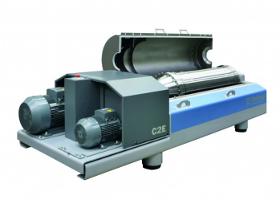
FLOTTWEG SE
Germany
The New C2E Decanter Centrifuges for Small Treatment Plants Flottweg presents a new era of sludge dewatering for small sewage treatment plants. The C2E decanter centrifuge was developed specifically for the dewatering and thickening of smaller sludge loading rates. It features all of Flottweg's know-how in a compact, space-saving design. Over five decades, Flottweg has gathered rich knowledge of the area of sewage sludge thickening and dewatering. That know-how has been transferred into a new generation of environmental centrifuges. Our requirements for the C2E are just as high as for the big Flottweg Decanters. Disposal costs still play a central role, even for small communities. The quality of the machine and its efficiency regarding separation results reduces the overall lifetime costs to a minimum. Want to learn more about our solutions? Then get in touch.
Request for a quote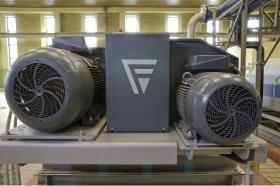
FLOTTWEG SE
Germany
Transport and disposal costs, at over 70 percent, represent by far the largest cost item in sludge dewatering. A powerful dewatering assembly is thus an important criterion. With a Flottweg HTS Decanter in the C series, you can achieve the highest possible total dry solids in the dewatered sludge, thereby continuously saving on transport and disposal. More than 50 years of experience in the dewatering of sewage sludge and continuous further development have gone into the design of the Flottweg HTS Decanter. This experience, combined with references from the entire world, makes Flottweg one of the leading providers of mechanical separation technology. The HTS Decanter is attractive for its performance, its efficiency, and its high cost-effectiveness. The decanters in the Flottweg C series cover a throughput range from about 5 to over 150 cubic meters per hour. We can offer you comprehensive know-how and customized systems.
Request for a quote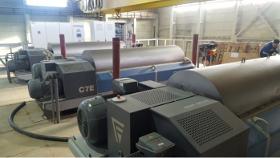
FLOTTWEG SE
Germany
Flottweg C series decanters around the world process 25 million liters of sewage sludge per hour. The dewatering and thickening of sewage sludge plays a decisive role in the wastewater treatment process. Requirements for the quality and efficiency of sewage treatment plants increase year after year, not least driven by the increasing costs of energy and disposal. As a result, the state of the art is now to use decanter centrifuges to dewater and/or thicken the incoming sludge. Flottweg developed the decanters of the C series especially for this purpose. The C7E represents the largest of all the C machines. The C7E increases the proportion of dry substance in the sludge, thereby reducing its volume and weight (due to loss of water). That means that operators need to dispose of, recycle, or burn less sludge. The result: enormous potential savings for the operators of sewage treatment plants.
Request for a quote
LIPP GMBH BEHÄLTER UND SYSTEMLÖSUNGEN
Germany
BIOGAS FOR INDUSTRY, MUNICIPALITIES AND AGRICULTURE In addition to tank construction, LIPP built the first biogas plant in Germany in the 70’s. Furthermore, LIPP was one of the first companies to develop and sell small biogas plants in the early 80’s. By steady advancements in production technology and the materials used, as well as extensive experience in process engineering LIPP has installed in collaboration with its partners, hundreds of biogas plants in Germany and worldwide. The majority of these projects are still in operation and ensure proof of the high quality and the technical and economic performance of Lipp’s system solutions. LIPP provide system solutions for biogas production in the following areas APPLICATIONS anaerobic wastewater treatment plants waste fermentation plants sewage sludge digestion agricultural biogas plants
Request for a quote
LIPP GMBH BEHÄLTER UND SYSTEMLÖSUNGEN
Germany
PATENTED DIGESTER WITH INTEGRATED GAS ACCUMULATOR LIPP KomBio Reactor for industry and local authorities The innovative and outstandingly economical solution for energy production at biogas plants and stabilisation of sewage sludge has been in use in many countries for over twenty years. Quick realisation, low investment costs, high operating safety and long service life are all characteristics that speak for themselves. The system is suitable for small and large plants and complies with industry standards. KEY BENEFITS Production of renewable energy and reduction of fossil CO2 emissions Low noise emissions Flexibility with regard to substrate composition Compact and space saving with minimal pipeline construction High functional safety Steel roof (can be insulated) to protect against the weather Individually customisable for intended application Good insulation reduces heating demand Patented stirring systems Fast construction with production on site Low investment costs
Request for a quote
LIPP GMBH BEHÄLTER UND SYSTEMLÖSUNGEN
Germany
MADE FROM VERINOX STAINLESS STEEL OR GALVANISED STEEL WITH VOLUMES RANGING FROM 40 M3 TO 10,000 M3 Both industry and communities require professional solutions for plant and tank construction and for the storage and treatment of liquids, as well as flexibility in terms of size, choice of material and equipment. When constructing liquid storage tanks, the selection of the best material is an important quality factor. Municipal/industrial waste water and sludge or certain processing, intermediate and end products from the chemical, pharmaceutical and food processing industries set high requirements regarding the tank material, for example. LIPP offers a variety of materials, ranging from galvanised steel through the combination material Verinox to high alloy stainless steels. APPLICATIONS Waste water tanks Sewage sludge tanks Process water tanks Storage tanks Firefighting water tanks Mixing and compensation tanks Buffer Tanks Stackable sludge tanks Storage containers
Request for a quote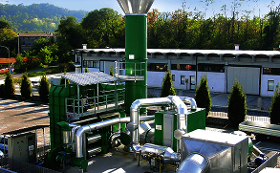
WESSEL-UMWELTTECHNIK GMBH
Germany
If no procedures for biological or chemical exhaiust air cleaning are to be used efficiently, the thermal treatment is regarded as method of choice. The basic thermal processes are Recuperative thermal oxidation Regenerative thermal oxidation Catalytic oxidation. The focus of our products lies particularly in the periphery of especially challenging special solutions Waste treatment Sewage sludge drying Waste water treatment Landfill aftercare Specialpurpose solutions for the chemical industry Food industry In general at corrosive media, at risk of condensation, and especially high specifications for the pure gas Since 2018 we are working close with our sister company Airprotech Srl. from Magenta/Italy in the field of thermal exhaust air cleaning. Beside our core products our range of products in the field thermal exhaust air cleaning is broadened Airprotech is specialised in the development, the manufacture and the supply of turnkey plants for thermal cleaning
Request for a quote
STEINER GMBH & CO. KG
Germany
Transporting recycling materials presents particular challenges for conveyor technology. The spiral conveyors for recycling materials need to be able to withstand materials with very different properties, unlike when transporting raw materials in industrial production processes or homogenous material such as granulates or pellets. In addition, the sturdiness in regards to environmental influences cannot be underestimated as a decisive factor for the longevity of the conveyor system as a whole.
Request for a quote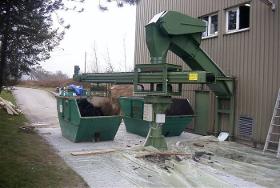
FÖRDERTEC GMBH
Germany
We supply conveyor belts in various models for bulk goods. The model primarily depends on the transported quantities and bulk good properties. Conveyor belts / belt conveyors can also be used advantageously even across longer distances and with higher transport quantities. Conveyor belts with trough belt guides serve specifically to dispose of sewage sludge or for transporting wood. We also supply suitable scraper systems for your belt systems. It is also possible to fill the containers for container loading. A reversible and swivel-mounted conveyor belt also allows up to 6 containers to be filled. The advantage here is that the containers can be filled completely by moving/turning the belt. This container filling option is an alternative to pushing containers on rails.
Request for a quote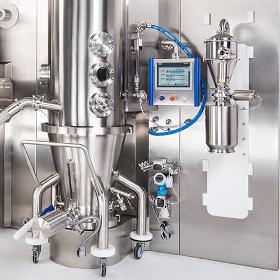
STE TECPHARM
Spain
Fluidized Bed Dryer designed for 3 different processes: ■ Drying of wet granulate (dryer). ■ Top drive granulation (granulator). ■ Bottom spray coating (coater). Innovative high-quality equipment certified by accredited entities. Fully designed and built in Europe following regulatory requirements and GMP´s normative. STE TECPHARM offers all range of services: installation “turnkey concept” in the client facilities, start-up, qualification, training, and production support. MAIN FEATURES ■ From 30 L to 1.540 L. [Other dimensions on request]. ■ In-wall design concept. ■ Built-in AISI 316L, mirror polished Ra < 0,5. ■ PCL + HMI in manual and automatic mode, with recipe editing. ■ 12 bar pressure-shock resistance.
Request for a quote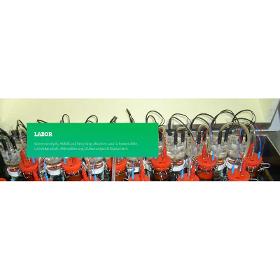
IUQ INSTITUT FÜR UMWELTSCHUTZ UND QUALITÄTSSICHERUNG DR. KRENGEL GMBH
Germany
Water analysis Drinking water investigation (TVO, Kalkaggressivität DIN 50930) microbiological examinations accredited sampling and analytics Basic and raw water investigations with identification of the ion balance limnological and marine sampling and testing Leachate investigations in the landfill area Operational monitoring of sewage treatment plants Operation monitoring of waterworks sewage sludge analyzes Investigation of concrete aggressiveness according to DIN 4030 Waste and recycling Examination of pollutants and expert support of dismantling of buildings and technical installations Site coordination by experts for safety and health protection when working in the contaminated area according to DGUV Rule 101-004 (formerly BGR 128) Health and safety plans for work in the contaminated area Emission monitoring of landfill sites (groundwater monitoring, leachate investigations, gas emission measurements, soil monitoring.
Request for a quoteResults for
Sewage sludge - Import exportNumber of results
31 ProductsCompany type
Category
- Import-export - chemicals and pharmaceuticals (10)
- Tanks, metal (4)
- Water purification - systems and equipment (3)
- Water treatment, industrial - systems and equipment (3)
- Import-export - mechanical engineering (2)
- Air purification - equipment and systems (1)
- Biogas and biofuel - energy use (1)
- Drainage systems and equipment (1)
- Goods handling systems, continuous (1)
- Heat exchangers (1)
- Pharmaceutical industry - machinery and equipment (1)
- Quality control and certification (1)
- Storage tanks (1)